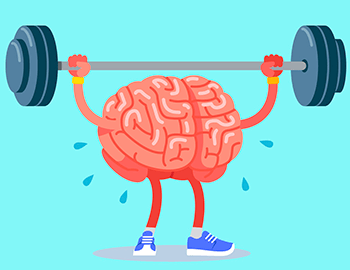The Importance of Exercise for Mental Health
Exercise for mental health is one of the most effective and natural ways to improve emotional well-being and overall mental stability. Physical activity has been proven to reduce stress, anxiety, and depression while enhancing cognitive function and self-esteem.
When engaging in exercise, the body releases endorphins, also known as “feel-good” hormones. These chemicals help alleviate negative emotions and promote a sense of happiness. Additionally, exercise improves sleep quality, which is essential for maintaining a stable mood and reducing mental fatigue.
Unlike medications, exercise offers a holistic approach to mental health. It not only addresses emotional well-being but also strengthens the body, creating a cycle of positive physical and psychological effects that contribute to a healthier lifestyle.
How Exercise Affects the Brain
Regular physical activity brings remarkable benefits to the brain, making it a crucial component of mental health care. Exercise increases blood flow, ensuring that the brain receives more oxygen and essential nutrients.
One of the key mechanisms behind this is neurogenesis, the process of creating new brain cells. Studies suggest that exercise stimulates the production of brain-derived neurotrophic factor (BDNF), a protein that supports brain plasticity, memory, and learning.
Additionally, engaging in physical activity helps regulate stress hormones like cortisol, preventing the negative effects of chronic stress on the brain. This is why exercise is often recommended as a natural remedy for individuals struggling with anxiety and depression.
The Benefits of Exercise on Mental Health
The benefits of exercise on mental health go beyond temporary mood boosts. Incorporating physical activity into daily life can lead to long-term improvements in emotional and psychological well-being.
- Reduced Symptoms of Anxiety and Depression: Exercise triggers the release of neurotransmitters like serotonin and dopamine, which help combat feelings of sadness and worry.
- Improved Cognitive Function: Engaging in exercise regularly enhances concentration, problem-solving skills, and memory retention.
- Enhanced Emotional Resilience: Physical activity strengthens mental toughness, making individuals more capable of handling life’s challenges with a positive mindset.

Best Types of Exercise for Mental Health
While all forms of physical activity offer mental health benefits, certain types of exercise are particularly effective in improving emotional well-being.
Aerobic Exercise
Activities like running, cycling, and swimming are excellent for boosting mood and reducing stress levels. Aerobic exercise increases heart rate, promoting better circulation and enhancing the release of endorphins.
Strength Training
Lifting weights or engaging in resistance exercises helps in building physical strength while also increasing confidence and reducing symptoms of anxiety.
Yoga and Mindfulness-Based Exercises
Yoga combines physical movement with deep breathing and meditation, making it an ideal exercise for mental health. It enhances relaxation and promotes emotional balance.
How Often Should You Exercise for Mental Health Benefits?
The frequency and intensity of exercise play a crucial role in determining its effectiveness on mental well-being. Experts recommend at least 150 minutes of moderate aerobic exercise per week or 75 minutes of vigorous activity.
For those new to fitness, starting with three to four sessions per week can be beneficial. The key is consistency, as long-term commitment yields the best mental health results.
How Exercise Improves Sleep Quality
One of the lesser-known but highly significant benefits of exercise on mental health is its positive impact on sleep. Regular physical activity regulates the body’s circadian rhythm, ensuring better sleep patterns.
Additionally, exercise reduces stress and anxiety levels, making it easier to fall and stay asleep. This leads to improved cognitive function and emotional stability during the day.
Exercise as a Natural Stress Reliever
Physical activity is an excellent way to manage and alleviate stress. Engaging in exercise provides a healthy outlet for releasing built-up tension and negative emotions.
- Promotes relaxation and reduces muscle tension
- Encourages deep breathing and mindfulness
- Helps refocus attention away from daily stressors
The Role of Outdoor Exercise in Mental Well-being
Exercising outdoors, also known as “green exercise,” enhances the psychological benefits of physical activity. Natural environments, such as parks and trails, provide a calming effect and boost feelings of well-being.
Sunlight exposure during outdoor activities also increases vitamin D levels, which play a role in regulating mood and preventing depression.

Social Benefits of Exercising
Working out in a group setting or participating in team sports adds a social component to exercise, which further enhances mental health. Social interactions help combat loneliness and create a sense of community.
Group activities such as dance classes, group workouts, and recreational sports provide motivation and accountability, making it easier to maintain a regular exercise routine.
How to Stay Motivated to Exercise for Mental Health
Sticking to an exercise routine can be challenging, but a few simple strategies can help maintain motivation and consistency.
Set Realistic Goals
Start with small, achievable goals and gradually increase intensity and duration to build confidence and momentum.
Find Enjoyable Activities
Engaging in exercises that bring personal enjoyment increases the likelihood of long-term commitment and adherence.
Track Progress
Keeping a workout journal or using fitness apps helps monitor progress and stay motivated by seeing improvements over time.
Recommended Reading
If you want to delve deeper into the subject, we recommend the e-book “Anxiety Under Control: Your Path to Peace and Control.” This resource provides in-depth explanations of mental health and practical tips for improving it naturally. It is an excellent guide for those looking for effective and sustainable solutions.
Conclusion
Exercise for mental health is a powerful, natural, and accessible tool for improving emotional well-being. Whether it’s reducing stress, enhancing cognitive function, or boosting mood, regular physical activity provides numerous psychological benefits.
By incorporating different types of exercise into daily routines and maintaining consistency, individuals can experience lasting improvements in their mental health. Prioritizing movement isn’t just about physical fitness—it’s about cultivating a healthier and happier mind.
Frequently Asked Questions About Exercise for Mental Health
How long does it take to see mental health benefits from exercise?
Many individuals report mood improvements immediately after exercising, while long-term benefits become noticeable within a few weeks.
Can exercise replace medication for mental health conditions?
Exercise can be a valuable complement to traditional treatments, but it is essential to consult a healthcare professional before making changes to medication.
What is the best time of day to exercise for mental health benefits?
The best time varies for each person. Morning workouts can boost energy for the day, while evening sessions may help with relaxation and stress relief.
Do I need to engage in high-intensity exercise for mental health benefits?
No, even moderate activities like walking or yoga can provide significant mental health benefits when done consistently.
How can I stay motivated to exercise regularly?
Setting goals, tracking progress, and choosing enjoyable activities can help maintain motivation and consistency.
